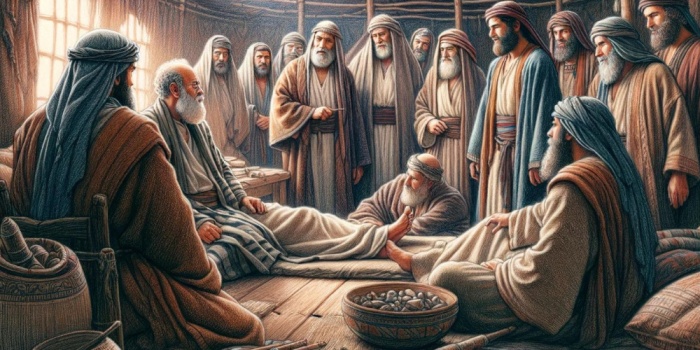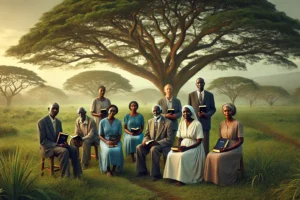
The Twelve Tribes of Israel: Genesis 49
The Twelve Tribes of Israel, originating from the twelve sons of Jacob, hold a foundational place in the history and spiritual heritage of the Jewish people. Each tribe, receiving a unique blessing from Jacob in Genesis 49, reflects not only individual characteristics and destinies but also the diverse paths these tribes would take in the formation of the nation of Israel. These blessings, rich in imagery and prophetic insight, outline the roles, territories, and future contributions of each tribe to the collective identity of Israel. Through these blessings, Genesis 49 serves as a pivotal moment, linking the patriarchal narratives to the future settlement and division of the land among the tribes, thus shaping the biblical narrative and Israel’s historical legacy.
- Reuben: Described as unstable as water, he lost his birthright due to indiscretion.
- Simeon and Levi: Cursed with dispersion within Israel for their violence.
- Judah: Foretold to hold the scepter, indicating royal lineage and leadership.
- Zebulun: Predicted to live by the seashore and harbor ships, suggesting trade.
- Issachar: Likened to a strong donkey, indicating hard work and agricultural success.
- Dan: Described as a judge of Israel, with a serpent’s cunning, hinting at strategic prowess.
- Gad: Foreseen to be a raiding band but also victorious in defense.
- Asher: Blessed with richness, producing royal delicacies, indicating prosperity.
- Naphtali: Likened to a free-running deer, symbolizing eloquence or swiftness.
- Joseph/Ephraim and Manasseh: Joseph’s sons each became heads of their own tribe, with Ephraim often representing the tribe of Joseph in prophetic texts, indicating a double portion of blessing and prosperity.
- Benjamin: Portrayed as a ravenous wolf, indicating a fierce, warrior spirit.
The Twelve Tribes of Israel, each emanating from the sons of Jacob (also known as Israel), are foundational to the biblical narrative and the historical and spiritual identity of the Jewish people. Genesis 49, where Jacob blesses his sons, offers not only personal prophecies but also foretells the destiny of the tribes that would emerge from them. Below is a comprehensive analysis of each tribe, incorporating insights from various scholarly perspectives.
1. Reuben
Characteristic: Instability Analysis: As the firstborn, Reuben’s potential for leadership was compromised by his impulsive act with Bilhah (Genesis 35:22). His tribe’s subsequent history lacks notable leadership or territory, reflecting his lost birthright.
2. Simeon and Levi
Characteristic: Violence
Analysis: Their curse stemmed from the massacre at Shechem (Genesis 34). Simeon’s territory was encircled by Judah’s, and Levi received no inheritance but was scattered as priests. Their actions illustrate the consequences of unrestrained anger.
3. Judah
Characteristic: Royal leadership
Analysis: Judah’s blessing of leadership and strength, symbolized by the lion, foretells the Davidic lineage and the Messiah’s coming from his line. This tribe’s prominence in Israel’s history underscores the significance of moral leadership.
4. Zebulun
Characteristic: Trade and prosperity
Analysis: Zebulun’s future near the seashore, engaging in trade, suggests economic prosperity. Though the exact fulfillment is debated, the tribe’s location and alliances facilitated trade and interaction.
5. Issachar
Characteristic: Agricultural abundance
Analysis: Described as a strong donkey, Issachar’s blessing points to a tribe content with agricultural richness but also burdened by labor. This reflects a life of productive toil and possibly subjugation.
6. Dan
Characteristic: Justice and cunning
Analysis: Dan is envisioned as a judge and a serpent, indicating a role in leadership and possibly military or strategic cunning. This is exemplified in the story of Samson and in Dan’s later relocation for territorial expansion.
7. Gad
Characteristic: Military prowess
Analysis: Gad’s blessing of overcoming attacks suggests a tribe characterized by resilience and warrior spirit, validated by their reputation as fierce warriors in David’s time and beyond.
8. Asher
Characteristic: Prosperity and luxury
Analysis: Asher’s land, rich and fertile, would produce royal delicacies. This blessing of abundance and luxury underscores the tribe’s prosperity in its territory.
9. Naphtali
Characteristic: Freedom and beauty
Analysis: Likened to a free-running deer, Naphtali’s blessing suggests swiftness and blessing in words, possibly indicating eloquent leadership or rapid expansion.
10. Joseph (Ephraim and Manasseh)
Characteristic: Fertility and prominence Analysis: Joseph’s blessings are fruitful, extending to his two sons, Ephraim and Manasseh, indicating multitudes and prominence. Ephraim often symbolizes the northern kingdom of Israel, highlighting the tribe’s significant role.
11. Benjamin
Characteristic: Warrior spirit
Analysis: Described as a ravenous wolf, Benjamin’s tribe is foreseen as fierce warriors, demonstrated by King Saul and the tribe’s aggressive history. This reflects the potential for both valor and violence.
Synthesis
The blessings of the Twelve Tribes in Genesis 49 offer a tapestry of prophetic insights that foreshadow the tribes’ historical roles, territorial inheritances, and moral lessons. The tribes’ varying destinies—from leadership and covenantal roles to warnings against violence and instability—reflect the complex moral and spiritual landscape the Israelites navigated. These blessings, therefore, serve not only as historical markers but also as ethical and spiritual guidance for the nation of Israel and, by extension, for all who study these texts.
Joseph is traditionally considered as a single patriarch, yet his inheritance was divided between his two sons, Ephraim and Manasseh, effectively giving Joseph a double portion. In many biblical and historical contexts, Ephraim and Manasseh are counted separately when listing the tribes, especially when considering territorial allocations and tribal roles in Israel’s history. This division into two tribes under Joseph’s lineage increases the number to 13 by name but maintains a count of 12 tribes by combining Ephraim and Manasseh into a single entity representing Joseph or by excluding Levi (due to the Levites’ unique role as priests without a territorial inheritance like the other tribes) or sometimes Simeon (due to its land being encompassed within Judah’s territory).
Therefore, the list may appear to count 11 distinct entities when Joseph is not split into Ephraim and Manasseh, reflecting the biblical narrative’s nuanced approach to the patriarchs and their descendants. This accounting method underscores the fulfillment of Jacob’s blessing to Joseph for a double portion, manifested through the significant roles and territories assigned to Ephraim and Manasseh, and it adheres to the symbolic completion of the tribes of Israel as twelve, a number signifying completeness and divine order in the biblical text.



